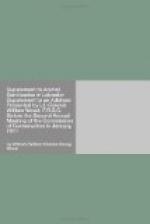I have taken much interest
in reading your paper. It seems
to be based on an extraordinary
acquaintance with the
situation.
Canada is blessed with many unique natural resorts of animal life and I have been particularly impressed with the invasions that have been made on the wonderful nesting places of the waterfowl. In my repeated stays on the coast of Gaspe and the islands of the Gulf, now running over a dozen years, I have had my attention forced to the hideous sacrifices of bird life that are constantly going on; for example in the Magdalen islands with their extraordinary array of shore birds. The great lagoons within the islands afford ideal breeding conditions, and an extraordinary attraction for the hunter as well.
My observation leads me to the conviction that the shooting law is not in the least respected on these islands, except perhaps by the residents themselves. In some cases the outsider is obliged to wait for the fall migration of the ducks and geese and so comes within the law, but there are plenty of early migrants that arrive during the close season, only to be quickly picked up by the summer hunter, who realizes that he is too far away to incur the law’s force.
As far as the shore birds are concerned, it is not the occasional hunter that does the real damage. The islands are becoming widely known to students of birds, and it is the bird student, the member of the Audubon Society, (in most instances, I regret to say, men of my own country) who are guilty of ruthless slaughter of the shore birds for their skins, and particularly for their eggs; all this in the protected season.
The situation is even worse on the Bird rocks. That is a protected area and yet is subject to fearful attacks from the egg hunters. I do not mean the commercial “eggers,” but the member of the Audubon Society who has a collection of birds’ eggs and skins and wants duplicates in order to enter into exchange with his colleagues. I met there on one of my visits an American “student” who had taken 369 clutches of eggs of each of the seven or more species of waterfowl there breeding, thus destroying at one swoop upwards of two thousand potential birds. It is no wonder that, with such a hideous desecration of the rights of the birds, the population of the Rocks is rapidly decreasing.
I believe the light-keeper is supposed to be a conservator of the birds and to prevent such uncontrolled destruction; but what can he do, a man who is practically exiled from the rest of his race for the entire year, frozen in for six months of the year? He is naturally so overjoyed at the sight of a fellow creature from the big world outside as to indulge him, whatever his collecting proclivities may be. The eggs that are taken by the occasional sailor seem to me to cut no figure at all in the actual diminution of the bird life there. That is a slender




